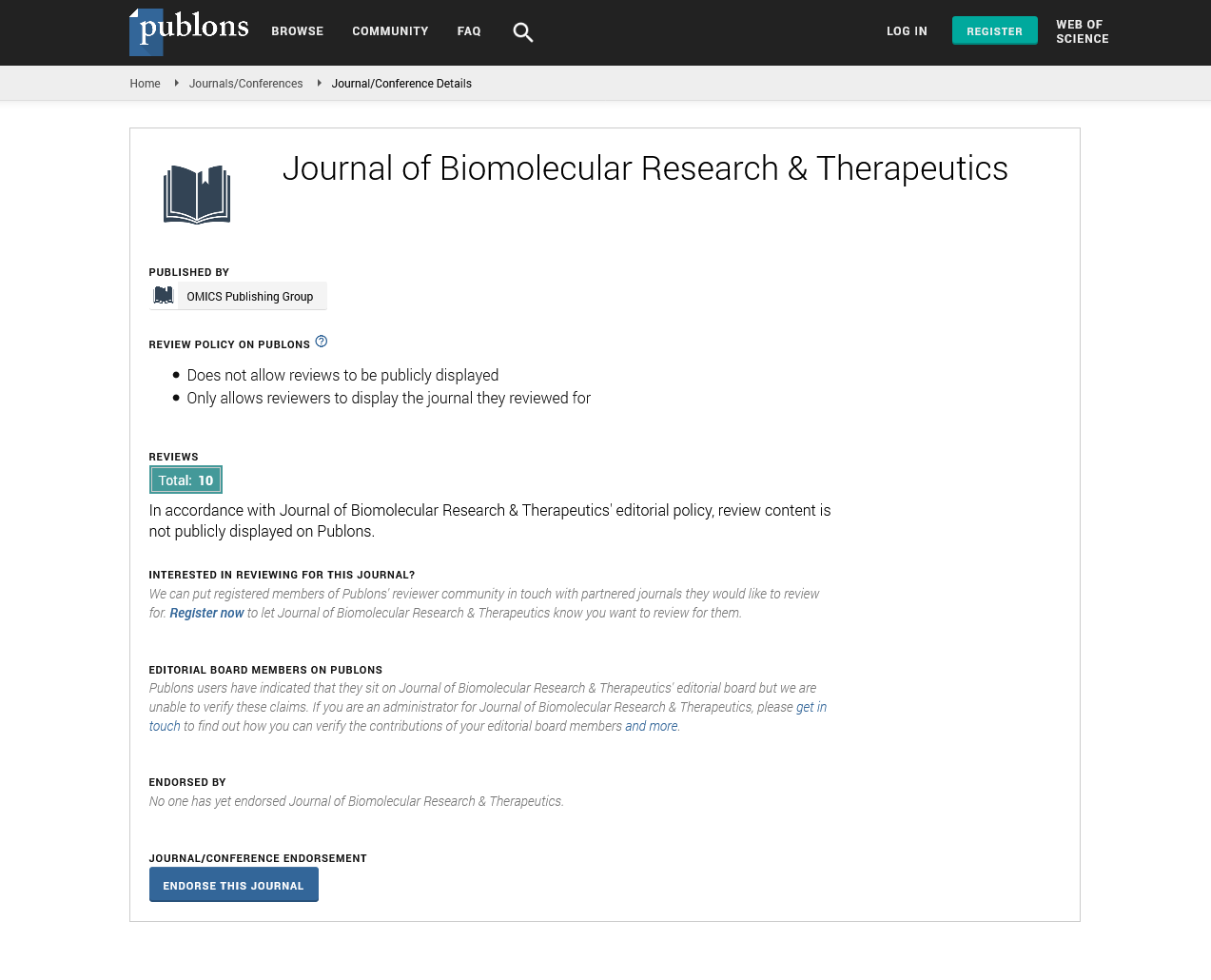Indexed In
- Open J Gate
- Genamics JournalSeek
- ResearchBible
- Electronic Journals Library
- RefSeek
- Hamdard University
- EBSCO A-Z
- OCLC- WorldCat
- SWB online catalog
- Virtual Library of Biology (vifabio)
- Publons
- Euro Pub
- Google Scholar
Useful Links
Share This Page
Journal Flyer

Open Access Journals
- Agri and Aquaculture
- Biochemistry
- Bioinformatics & Systems Biology
- Business & Management
- Chemistry
- Clinical Sciences
- Engineering
- Food & Nutrition
- General Science
- Genetics & Molecular Biology
- Immunology & Microbiology
- Medical Sciences
- Neuroscience & Psychology
- Nursing & Health Care
- Pharmaceutical Sciences
Commentary - (2023) Volume 12, Issue 3
Biomarkers and its Therapy in Hepatocellular Carcinoma
Lee Tseng*Received: 03-Mar-2023, Manuscript No. BOM-23-20101; Editor assigned: 06-Mar-2023, Pre QC No. BOM-23-20101(PQ); Reviewed: 22-Mar-2023, QC No. BOM-23-20101; Revised: 29-Mar-2023, Manuscript No. BOM-23-20101(R); Published: 05-Apr-2023, DOI: 10.35248/2167-7956.23.12.271
Description
Hepatocellular Carcinoma (HCC) is one of the leading causes of cancer. As a result there is an ongoing effort to enhance screening, diagnostic and treatment options in order to improve the prognosis of this cancer. Despite varying cut-off points, current serum biomarkers exhibit low sensitivity and diverse specificity especially when tested longitudinally with a group of serum biomarkers. HCC biomarkers employed for prognostic purposes on the other hand may play a larger clinical role in the near future [1]. Additionally several serum biomarkers have already been identified as a therapy screening method whether to offer access to specific medicines or to guide therapy selection. Hepatocellular Carcinoma (HCC) is now one of the most common cancers and a leading cause of mortality worldwide throughout the last few decades there have been some advancements in the therapeutic strategy for both early and advanced HCC stages. On the contrary no major clinical improvement in HCC biomarkers for screening and early diagnosis has occurred.
These biomarkers on the other hand may play a clinical function in prognosis and therapy response. Despite the fact that various serum or tissue biomarkers have been investigated, their clinical value has not been broadly accepted [2]. One of the most significant concerns and possibly its Biggest weakness is their low sensitivity which precludes HCC biomarkers from being therapeutically effective for early HCC detection. The majority of these indicators have been linked to a poor prognosis in either early or advanced HCC. Furthermore tumor indicators for optimal therapy selection or response have received a lot of attention in recent years. Even with the introduction of new therapeutic oncologic methods such as immunotherapy with targeted therapies , new biomarkers, with the exception of Alpha-Feto Protein (AFP) have yet to become commonplace. As a result, it is to create new biomarkers for early diagnosis, appropriate patient therapy selection, and post-treatment prognosis, such as proteomics, metabolomics, genomes and other novel biomarkers like micro biome [3]. Although the evidence-based data for HCC surveillance is limited to moderate, with only two randomized trials in patients with chronic hepatitis B infection with a significant risk of bias and several observational studies in cirrhosis, surveillance for HCC is widely recommended by international guidelines. Many epidemiological grounds back up this recommendation. HCC constitutes a major threat to public health, current being the fourth cancer-related cause of death worldwide. Patients with chronic hepatitis B (HBV) or C virus (HCV) as well as people with any chronic liver disease with severe fibrosis or cirrhosis are among those at risk. It should be mentioned that the evidence for HCC surveillance is moderate in chronic HBV patients and weak in cirrhotic patients [4]. There were no randomized controlled trials that assessed the survival benefit of HCC surveillance in cirrhotic patients, and in some studies. However, due to the ethical issues associated with running a study with a non-interventional arm, current recommendations are based on the existing evidence. The discovery of an alternative biomarker capable of detecting early-stage and conventional tumour markernegative HCC is critical [5]. Protein Kinase C delta (PKC) is preferentially released into extracellular space from HCC cell lines and promotes to tumor growth and its blood levels are higher in HCC patients. T efficacy of serum PKC for detecting HCC in Chronic Liver Disease (CLD) patients.
References
- Georgopoulos SD, Polymeros D, Triantafyllou K, Spiliadi C, Mentis A, Karamanolis DG, et al. Hypergastrinemia is associated with increased risk of distal colon adenomas. Digestion. 2006; 74(1):42-46.
[Crossref] [Google Scholar] [PubMed]
- Fujimori S. Progress in elucidating the relationship between Helicobacter pylori infection and intestinal diseases. World Journal of Gastroenterology. 2021; 27(47):8040.
[Crossref] [Google Scholar] [PubMed]
- Jones M, Helliwell P, Pritchard C, Tharakan J, Mathew J. Helicobacter pylori in colorectal neoplasms: is there an aetiological relationship?. World journal of surgical oncology. 2007;5:1-6.
[Crossref] [Google Scholar] [PubMed]
- Huang HE, Yang YC, Wu JS, Wang RH, Lu FH, Chang CJ. The relationship between different glycemic statuses and colon polyps in a Taiwanese population. J Gastroenterol. 2014;49:1145-1151.
[Crossref] [Google Scholar] [PubMed]
- Li Z, Zhang W, Bai J, Li J, Li H. Emerging role of Helicobacter pylori in the immune evasion mechanism of gastric cancer: an insight into tumor microenvironment-pathogen interaction. Front Oncol. 2022;12.
[Crossref] [Google Scholar] [PubMed]
Citation: Tseng L (2023) Biomarkers and its Therapy in Hepatocellular Carcinoma. J Biol Res Ther. 12:261.
Copyright: © 2023 Tseng L. This is an open access article distributed under the terms of the Creative Commons Attribution License, which permits unrestricted use, distribution, and reproduction in any medium, provided the original author and source are credited.

